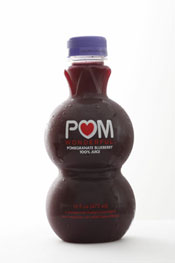Sep. 27, 2010 at 2:29 p.m.
Filed under:
Advertising/Marketing,
Food
By Julie Wernau
 POM Wonderful isn’t quite as wonderful as it claims, the Federal Trade Commission said Monday, after filing a complaint that challenges the company’s statements that pomegranate can prevent and treat everything from heart disease to erectile dysfunction.
POM Wonderful isn’t quite as wonderful as it claims, the Federal Trade Commission said Monday, after filing a complaint that challenges the company’s statements that pomegranate can prevent and treat everything from heart disease to erectile dysfunction.
The agency called the claims — found in advertisements in print publications and on the Internet — “false and unsubstantiated” and based on flawed medical research.
In a story this March, the Tribune named POM Wonderful as one of several products on the market that made health claims in its advertising that are permissible only for FDA-approved drugs. Yet, POM Wonderful has staked its name on the fruit’s health benefits. According to POM Wonderful, since 1998 the company has paid $34 million to support pomegranate-related research at universities and by other scientists, yielding approximately 55 published studies. Get the full story »
July 28, 2010 at 4:43 p.m.
Filed under:
Crime,
Criminal charges,
Litigation
By Ameet Sachdev and Ray Gibson | In an extraordinary maneuver, the federal appeals court in Chicago removed a judge from an ongoing criminal trial after ruling that he had made an error in the case.
The 7th Circuit U.S. Court of Appeals did not give an explanation in its Tuesday order, which dismissed U.S. District Judge James Holderman from the jury trial of a man facing drug charges. The court said it would follow up with an opinion.
The lack of explanation left court watchers wondering what Holderman did to incite such a harsh penalty. The appellate court reverse judges all the time. But removing one in the middle of a trial may be unprecedented. Get the full story »
By Reuters
The U.S. copyright office issued exemptions to a copyright law, giving legal protection for people who unlock their smartphones like Apple Inc.’s iPhone.
Changing operators’ fixed phone settings — a concept known as “jailbreaking” — has become widely popular around the world since the 2007 introduction of Apple’s iPhone.
The move by the copyright office to give exemptions to the Digital Millennium Copyright Act (DMCA) will undermine handset makers like Apple’s ability to control the installation of software programs on their phones. Get the full story »
By Julie Johnsson
The European Union plans on Wednesday appealed a World Trade Organization ruling that Airbus SAS received $20 billion in illegal government subsidies that unfairly tilted the global aircraft market — to the detriment of Chicago-based Boeing Co. The appeal had been widely expected, and will likely prolong the already long-running dispute between the E.U. and U.S. over government funding to planemakers Airbus and Boeing. Get the full story »
July 19, 2010 at 3:46 p.m.
Filed under:
Banking,
Investing,
Policy,
Politics,
Regulations
By Reuters
The broadest shake-up in U.S. financial services law since the Great Depression will likely require the Securities and Exchange Commission to beef up its staff with 800 new positions, the SEC’s chief said in prepared remarks on Monday. Get the full story »
July 7, 2010 at 5:02 p.m.
Filed under:
Banking,
Consumer news,
Litigation,
Updated
By Becky Yerak
Two HSBC units were hit with two federal class-action lawsuits last week claiming they’ve sold confusing credit-card “payment protection” plans to senior citizens, the unemployed and disabled residents in New Jersey and Pennsylvania who might not be eligible for the coverage plans.
The lawsuits against HSBC Bank USA and HSBC Card Services Inc., which is based in Illinois, were filed July 2 in U.S. district courts in Pennsylvania and New Jersey, and seek class-action status. The suits claim that HSBC, whose U.S. consumer finance unit is headquartered in Mettawa, marketed such “payment protection” products called “Personal Account Protection,” “Personal Account Protection Elite” and “Account Secure Plus” to credit-card customers.
HSBC declined to comment. Get the full story »
Feb. 24, 2010 at 2:57 p.m.
Filed under:
The Federal Trade Commission released the list of top complaints the agency received from consumers throughout 2009. The good news: Identity theft complaints dropped five percentage points from 2008. The bad news: They’re still at the top of the list, making up 21 percent of the complaints.
Find out what the top 50 complaints are at the Problem Solver’s blog.
 POM Wonderful isn’t quite as wonderful as it claims, the Federal Trade Commission said Monday, after filing a complaint that challenges the company’s statements that pomegranate can prevent and treat everything from heart disease to erectile dysfunction.
POM Wonderful isn’t quite as wonderful as it claims, the Federal Trade Commission said Monday, after filing a complaint that challenges the company’s statements that pomegranate can prevent and treat everything from heart disease to erectile dysfunction.




